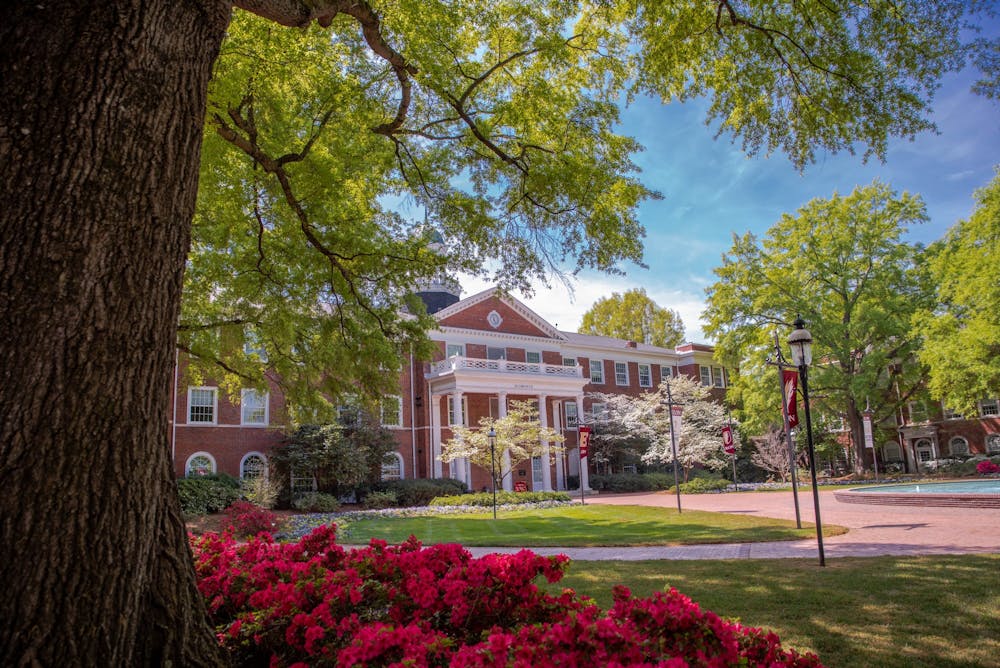Whether they received nominations from the board or President Connie Book herself, members of the Elon University Board of Trustees are appointed and selected to serve four-year terms to further the university’s mission.
The positions, which are voluntary, are occupied by members of the greater Elon community, parents and alumni, as well as people who may have no connection to the university, but want to “help move the university forward,” according to Patrick Noltemeyer, who serves as secretary to the Board of Trustees.
“I’m always impressed when someone says that they are willing to be a member of the Board of Trustees for an institution of higher education because nobody has to do that,” Noltemeyer said. “But it’s a way for them to make a positive impact on the world and they choose to do it for our board.”
Joining the board
The Board of Trustees Governance and Nominating Committee is a group of at least three trustees that receive recommendations from current board members and others for individuals to fill vacant seats on the board. The group makes nominations and recommendations to the board for discussion. Currently, there are 10 board members who serve on this committee.
Noel Allen ‘69, a member of the governance and nominating committee, said he looks to build a board that would improve Elon in the long-term. Frequently, candidates for the board are recommended by other trustees and staff members. The candidates are then vetted, a process which includes a meeting where current board members tell the candidate what the job entails and gauge their interest.
Candidates can be nominated based on the field they work in and the university’s interests. Noltemeyer used the Boldy Elon strategic plan’s initiative of growing the STEM and engineering program as an example.
“If I were a board member, I would nominate somebody from the private sector who has experience in engineering that would know what graduates would need to know to succeed as engineers in the future.” Noltemeyer said. “Somebody who has hired people with an engineering degree.”
Noltemeyer said this is not the only way to get on the board.
“It could also be that there’s somebody that has the capacity financially to support an initiative like that and are interested in helping to advance that part of Elon’s mission,” Noltemeyer said.
Donations are not required to be on the Board of Trustees. However, some board members — like Charles Clohan, William Inman, Dalton L. McMichael and others — have given money to help fund buildings and scholarships. Due to their donations, Elon has named buildings after them and their families.
“It is a volunteer board. There’s no required donation. But we do ask that they do attend meetings regularly,” Noltemeyer said.
Board members can also be selected as a possible candidate for the Board of Trustees from personal connections. Allen has a longstanding connection to Elon. He grew up in the town while his dad took night classes at the university and is an alumnus himself.
As a student, Allen was part of a planning committee put together by President Emeritus J. Earl Danieley and became involved in the alumni associations after graduation. In 1985 he was contacted to become a member.
Once a candidate is selected, a vote is then held among the current trustees on whether to elect them. If a majority votes in favor of a candidate, they become a trustee.
Currently, students are not involved in the process.
“There is not one [way for students to participate] right now. I think the trustees keep the mission in mind and at the forefront all the time, and I think the students would also be doing the same,” Noltemeyer said.
In the upcoming years the board will be experiencing something for the first time in their nominating process: reelection. In 2014, new term limits were set for any future members. After serving two consecutive four-year terms, trustees have to take a one-year hiatus before they can be considered for reelection to the board.
Noltemeyer said the reason for this was to allow for more turnover “so that new ideas can come to the table.”
He also said it gives the board structure.
“I think it helps both the individual who is considering becoming a trustee, and the university in the stating ‘Let’s do this for four years and then let’s have another conversation.’” Noltemeyer said.
For Allen and the over 25 other board members who joined before 2014, this rule does not apply, as it is only for members who joined after that year.
Leaving the Board
According to Noltemeyer, the recommendation for the removal of a trustee by the Governance and Nominating Committee requires a majority vote from the 35-member board of trustees, similar to the process of becoming a board member.
There must be “adequate cause” —which is defined in the board’s bylaws — to remove a trustee, according to Owen Covington, director of the Elon University News Bureau. Adequate cause can be anything from not fulfilling one’s responsibilities to failure to attend meetings, and is up to the purview of the members of the board, Noltemeyer said.
“Adequate cause” is defined in the bylaws as including but not limited to the refusal or neglect to discharge the duties of a trustee, conduct that is contrary to the interests and welfare of the university, or absence without an acceptable excuse from two or more consecutive board meetings.”
“Adequate cause” was updated from a previous version of the bylaws which stated that “trustees may be removed from office at any time without cause” by majority vote.
As controversy surrounding prominent board member and Postmaster General Louis DeJoy continues, some Elon community members have voiced their concerns, and started petitions calling for DeJoy’s removal. While Allen said he does not speak for the nominating committee, removal of any trustee must go beyond “political disagreement.”
“You have to be looking for not just political disagreement. Actual tangible proof of some illegality,” Allen said.


